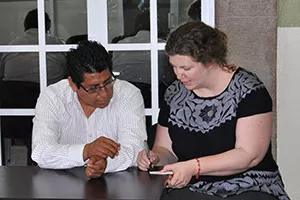Linguistics Students Help Revitalize Critically Endangered Language in Mexico

A professor and three Tri-Co students recently visited the leaders of a city in Oaxaca, Mexico, to present their Zapotec Talking Dictionary, designed to help revitalize a native language on the verge of disappearing.
Carolyn Anderson '14 was nervous about that early-May visit to Tlacolula de Matamoros. She and the rest of the Tri-Co team were proud of their work on the dictionary but unsure of how it would be received. But those nerves vanished as soon as Assistant Professor of Linguistics Brook Lillehaugen displayed the dictionary on her phone.
"[The Tlacolula leaders] started smiling," says Anderson, a linguistics major from Tacoma, Wash. "These are important, busy men, but they all took the time to squint at the small screen and try it out. You could see their faces light up as the phone was passed around the room."
The Zapotec language family is comprised of approximately 40 languages, all endangered, says Lillehaugen. The variety spoken in Tlacolula de Matamoros is critically endangered, with only about 100 elderly speakers remaining. Key causes include economic and ideological factors that push native-language speakers to adopt Spanish.

Assistant Professor of Linguistics Brook Lillehaugen presents the Zapotec Taking Dictionary via smartphone.
On the front line of the movement to revitalize native languages is K. David Harrison, associate professor of linguistics and co-leader of the National Geographic project Enduring Voices. He views languages as "the primary conduit for human culture."
"Each of the Mexican indigenous languages contains millennia of human experience, wisdom, and practical knowledge about the natural environment," Harrison tells National Geographic News.
Sponsored by National Geographic, Harrison determined the need for a talking dictionary for the Zapotec language. He enlisted Lillehaugen, already set to teach a course on Zapotec language last fall, to produce it.
"I hoped it would be a way to bring Zapotec voices into my classroom," she says, "but it became so much more."
Eight students from Haverford, Bryn Mawr, and Swarthmore (including Caroline Batten '14, an Honors English literature major from West Newton, Mass.) helped build the dictionary from the ground up, says Lillehaugen - conducting the research to expand it and collaborating with members of the Zapotec community to enhance it.
The town council of Tlacolula de Matamoros invited the Tri-Co team to come present its work on the dictionary and discuss further collaboration, which will include a Tri-Co student returning this summer to offer a Talking Dictionary workshop to the community. The highlight, however, was the Tlacolulans - including the mayor - marveling at the sight of their heritage on big screens and phones.
"The Tlacolula Zapotec are a rural, agrarian community, but they are quickly crossing the digital divide and eager to create digital tools and resources for their language," says Harrison. "It's a great example of how endangered language communities are leveraging new technologies to maintain their heritage languages."
As important as technology is to the revitalization effort, another of Anderson's highlights was decidedly retro. She relished the opportunity to go into the Colonial Zapotec archives to see and touch centuries-old texts.
"It was incredible to hold them in my hands and see the little details that don't stand out in the PDFs that I've been working from: the decorations on the letters, the differences in ink and handwriting, the bindings," she says. "I feel a strong connection to these texts, to the thoughts and emotions and relationships of real people that they reveal."
So much of the work in revitalizing languages is "spreading the message that these languages are important and worth caring about," she adds. "Putting something in a dictionary, and putting something online, that's something that people can point to as proof that the language matters."



